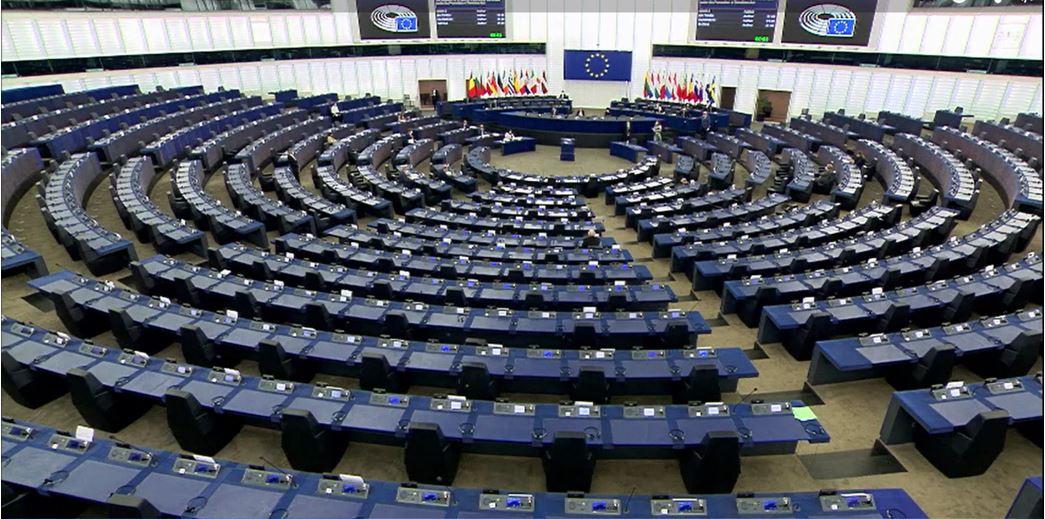Concerns raised in European EU Parliament on Sri Lanka’s Prevention of Terrorism Act PTA in line with GSP+ facility
Concerns have been raised in the European Parliament on Sri Lanka’s draconian Prevention of Terrorism Act (PTA) as the law is not in line with the conventions that Sri Lanka has to implement under the Generalized Scheme of Preferences (GSP+) granted to the island nation. The European Parliament EU adopted a resolution on Sri Lanka calling for the repeal of the Prevention of Terrorism Act (PTA). The resolution on Sri Lanka was adopted with 628 votes in favour, 15 against and 40 abstentions. EU MPs have also propose to carefully assess whether there is sufficient reason, as a last resort, to initiate a procedure for the temporary withdrawal of Sri Lanka’s GSP+ status.
Helena Dalli, European Commissioner for Equality delivering a speech at the EP plenary session debates on cases of breaches of human rights, democracy and the rule of law said amending the PTA to bring it in line with international standards was a key commitment of Sri Lanka in the run-up to its readmission to the Generalized Scheme of Preferences (GSP+) in 2017.
However, so far, there has not been any progress and in fact, the Sri Lankan government even broadened the scope of the PTA in March extending period of detention under the Act to two years, the Commissioner said.
“We see the removal of constitutional safeguards, we see lack of accountability, we see discourse to exclude people, we see civil society being excluded and we see the use of the Prevention of Terrorism Act to detain activists, writers and more.”
“The EU must defend universal rights unambiguously. Anyone who is detained under this terrorism act should be judged fairly. If they haven’t been accuse they should immediately be freed,” the Commissioner said.
She said the EU needs to look at the GSP+ system and evaluated as it could be a way to ensure that Sri Lanka fulfills its obligations on human rights.
“The issue will remain at the heart of our engagement with Sri Lanka in the framework of the GSP+ monitoring,” the Commissioner said.
Following is the statement delivered by Helena Dalli, European Commissioner for Equality:
Honorable Members,
The European Union enjoys and values the broad and multifaceted relationship it has developed with Sri Lanka over the past decades. The European Union’s approach towards the country has always been underpinned by full respect for values and international standards, stressing the importance of upholding human rights, inclusion and reconciliation.
The European Union much regretted Sri Lanka’s withdrawal from the United Nations Human Rights Council resolution 30/1 without any real domestic measures to confirm that the government is taking reconciliation seriously, and its refusal to co-sponsor the new resolution, 46/1, adopted by the Council in March.
The Parliament’s resolution points to a number of worrying developments, and the EU has clearly noted in the Human Rights Council in March that the reports by notably the United Nations High Commissioner for Human Rights indicated trends towards a deteriorating human rights situation, including those of the LGBTIQ community.
The Parliament rightly emphasizes that security forces continue to apply the Prevention of Terrorism Act (PTA), which deprives detainees of due process rights, authorizes executive sanctioned detention without charge, and has facilitated the use of torture. Amending the PTA to bring it in line with international standards was a key commitment of Sri Lanka in the run-up to its readmission to the Generalized Scheme of Preferences (GSP+) in 2017.
The law is not in line with the conventions that Sri Lanka has to implement under the GSP+. We have raised the issue with the new authorities, and they confirmed their intent on revisiting the provisions of the PTA with a view to making the appropriate amendments. So far, however, there has been no progress, and we have seen that on 9 March, the scope of the Act was broadened to allow for two years of detention without trial for those suspected of causing religious, racial or communal disharmony. The issue will remain at the heart of our engagement with Sri Lanka in the framework of the GSP+ monitoring.
We will continue our open and critical engagement with Sri Lanka not only within the framework of the GSP+ monitoring, but in our regular bilateral dialogue. – Thank you.
The situation in Sri Lanka, in particular the arrests under the Prevention of Terrorism Act – video: https://audiovisual.ec.europa.eu/en/video/I-207032

